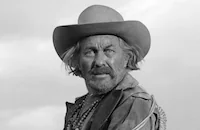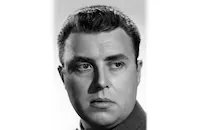The Ballad of Cable Hogue

Brief Synopsis
Cast & Crew
Sam Peckinpah
Jason Robards Jr.
Stella Stevens
David Warner
Strother Martin
Slim Pickens
Film Details
Technical Specs

Synopsis
Abandoned in the desert by partners Bowen and Taggart, prospector Cable Hogue swears revenge. After four days of aimless wandering and desperate prayer Hogue discovers water. As its site is the only hole within 40 miles and conveniently close to the stagecoach route, Hogue establishes Cable Springs, an oasis for weary travelers. The entrepreneur, however, shoots his first customer when the client refuses to pay the 10-cent drinking fee. His second visitor, Joshua Sloane, a lecherous evangelist, guards the waterhole while Hogue rides into the town of Deaddog to file his claim. Although the stagecoach manager, Quittner, refuses to stake him, town banker Cushing invest $100. The budding entrepreneur hies to Hildy, the town prostitute, who gives him a bath. Hearing a revival outside, Hogue is reminded of Sloane and leaves abruptly without paying the prostitute. His claim secure and business booming, Hogue offers Hildy sanctuary when she is driven from Deaddog by pious citizens. The two fall in love, but Hildy leaves for San Francisco and a rich husband. Her departure coincides with the arrival of Hogue's former partners, intent on the acquisition of their old friend's fortune. The wiley prospector, guessing their purpose, traps the pair in a snakepit, shooting Taggart and sparing Bowen. When the widowed and enriched Hildy arrives to spirit her lover to New Orleans, he is accidentally crushed by her automobile. As he expires Hogue is eulogized by Sloane.

Director

Sam Peckinpah
Cast

Jason Robards Jr.

Stella Stevens
David Warner

Strother Martin

Slim Pickens
L. Q. Jones

Peter Whitney
R. G. Armstrong

Gene Evans
William Mims

Kathleen Freeman
Susan O'connell

Vaughn Taylor
Felix Nelson
Max Evans
Darwin W. Lamb
James Anderson
Mary Munday
William Faralla
Matthew Peckinpah
Victor Izay
Easy Pickens
Crew
Lucien Ballard
Kathy Blondell
Sonny Burke
Leroy Coleman
John Crawford
Gordon Dawson
William Faralla
Phil Feldman
Phil Feldman
Al Fleming
Robert Fletcher
John Gaudioso
Richard Gillis
Jerry Goldsmith
Jerry Goldsmith
Bud Hulburd
Kinney National Co.
Frank Kowalski
Latigo Productions
Gary Liddiard
Louis Lombardo
Jack Mills
Arthur Morton
Sam Peckinpah
Edmund Penney
Don Rush
Frank Santillo
Dink Templeton

Videos
Movie Clip




Film Details
Technical Specs

Articles
Sam Peckinpah's The Ballad of Cable Hogue on DVD
When we think of the late Sam Peckinpah, we automatically remember extreme, violent movies like The Wild Bunch or Bring Me the Head of Alfredo Garcia. Often overlooked are his tender, low-key early-1970s movies Junior Bonner and The Ballad of Cable Hogue. The second just debuted on DVD, individually and as part of the Sam Peckinpah's Legendary Westerns Collection boxed set, and it's among the best of the director's many odes to misfits.
It's certainly the most light-hearted. It rides a roguish performance by Jason Robards as the title character, a failed prospector who's left for dead in the Arizona desert by his two cohorts (Dub Taylor, L.Q. Jones), but who discovers an oasis that literally and then financially saves him. Cable digs out the mudhole he finds into a well, makes a deal with the local stagecoach line to operate a station in what he christens Cable Springs and picks up the friendship of two other misfits along the way: Hildy (Stella Stevens), a shapely prostitute he falls for after sighting her when filing his land claim in the nearest town, and Josh Sloan (David Warner), a self-proclaimed preacher whose appetite for sin usually trumps his pleas for salvation.
The love between Cable and Hildy is central to the story. Peckinpah, working from a script by John Crawford and Edmund Penney (neither of whom have any substantial credits beyond this), leaves little doubt what Cable sees in Hildy, repeatedly inserting a shot of her cleavage into their first meeting to comic effect. It's crass, but it captures smitten Cable's lust, and after a while Hildy is charmed by Cable's cranky individualism. The romance here is unusually mature, with both Cable and Hildy aware of each other's flaws and willing to accept them (the pair is in sharp conquest to a stuffy "proper" husband and wife Cable encounters early in the action). Their relationship is also good and bawdy, with Stevens, who's never looked more delectable, oozing sensuality and physical confidence. But she also makes Hildy a warm, wise person who isn't going to give up her dream of striking it rich in a big city in order to indefinitely hang out in the desert with Cable. The combination of Stevens' body, brains, comic timing and emotions makes Hildy the Nutty Professor actress' best role. She and Robards even sing a song together, one of several on the soundtrack. The songs and the occasionally speeded-up scenes of slapstick are hardly highlights of the movie, but they are part and parcel of its loose atmosphere.
Despite the differences in tone from his more violent films, the movie is unmistakably Peckinpah's, and not just in Cable's cockeyed idealism and vengeful streak or the fact that the movie, like its title character, is lovably ramshackle. Like Peckinpah's Ride the High Country and The Wild Bunch, The Ballad of Cable Hogue is set at the turn of the 20th century and, like the protagonists of those movies, Cable becomes an oddball symbol for the passing of the Wild West. The appearance of the automobile, a measure of change common to all three movies, becomes centrally important to The Ballad of Cable Hogue, with the sad climax of the comedy becoming unexpectedly poignant in its eulogy of the end of an era.
Like the other DVD releases of Peckinpah movies, the disc of The Ballad of Cable Hogue includes another audio commentary by Nick Redman, Paul Seydor, Garner Simmons and David Weddle, Peckinpah biographers who mull the contexts and influences for the movie with little of the stuffiness "film scholar" audio commentaries usually have. Redman also contributes "The Ladiest Damn'd Lady," a welcome but flawed half-hour interview with Stevens named for Hildy's line about what she aims to become in San Francisco. This is a problematically shapeless featurette, as it omits the interviewer's questions. Consequently, shifts in subjects can be jarring, as Stevens segues from talking about how much she liked Hildy to how difficult Peckinpah was ("he only thought about himself") to the most intriguing tidbit supplied—that, for cutting her asking price and deciding to work with Peckinpah, Stevens' deal with the director to appear in The Ballad of Cable Hogue not only included the promise that Hildy would return to the desert in the script's third act, but that Stevens also would star in another of his movies. She was supposed to get the female lead in his 1972 adaptation of Jim Thompson's The Getaway, but star Steve McQueen nixed that, a disappoint Stevens saw coming the first time she and McQueen met.
For more information about The Ballad of Cable Hogue, visit Warner Video.
by Paul Sherman

Sam Peckinpah's The Ballad of Cable Hogue on DVD
Quotes
Since I cannot rouse heaven I intend to raise hell.- Joshua Sloane
Did it ever occur to you how wise and bountiful God was to put breasts on a woman? Just the right number in just the right places.- Reverend Joshua Sloane
I'll live to spit on your grave!- Cable Hogue
If sugar were two cents a barrel, I couldn't afford a pinch of salt and egg to put on it.- Cable Hogue
Give me that rifle!- The Stranger
I'll give you what's in it!- Cable Hogue
Trivia
Sam Peckinpah started work on this film almost immediately after finishing work on the landmark _The Wild Bunch (1969)_ . That is why Strother Martin and L.Q. Jones were cast in similar roles in both films.
Notes
Exteriors filmed in Arizona and Nevada.

Miscellaneous Notes
Released in United States June 2000
Released in United States March 18, 1970
Released in United States Spring March 1, 1970
Shown at Anthology Film Archives in New York City as part of a Sam Peckinpah Retrospective, June 6-11, 2000.
Released in United States Spring March 1, 1970
Released in United States March 18, 1970
Released in United States June 2000 (Shown at Anthology Film Archives in New York City as part of a Sam Peckinpah Retrospective, June 6-11, 2000.)













